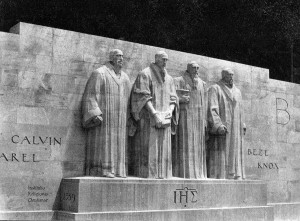 Speaking theologically, what does it mean to be “Reformed”?
Speaking theologically, what does it mean to be “Reformed”?
I came across this list which was put together by Brandon Solberg, and believe it to be a very helpful, useful guide:
Historically Reformed
– Affirm the great “sola’s” (Latin for “only”) of the Reformation.
Sola Gratia…Grace Alone
Sola Fide…Faith Alone
Solus Christus…Christ Alone
Sola Scriptura…Scripture Alone
Soli Deo Gloria…To the Glory of God Alone
To summarize, salvation by Grace Alone, through Faith Alone, in Christ Alone, according to the Scriptures Alone, to the Glory of God Alone.
– Affirm and promote a profoundly high view of the supremacy and sovereignty of God in all things and sees God as actively involved in His creation, governing and overseeing all the affairs of men. cf. Psalm 115:3; Job 34:14-15; 37:6-13; Daniel 4:35.
– Affirm the utter dependence of sinful man upon God in all things, especially concerning salvation.
– Affirm the Doctrines of Grace (commonly referred to as Calvinism), which display God as the author of salvation from beginning to end.
The acrostic TULIP (which is a summation of the Canons of Dort) is the most familiar way of delineating the doctrines of Grace. TULIP is made up of 5 points, which are:
* T – Total Depravity
* U – Unconditional Election
* L – Limited Atonement
* I – Irresistible Grace
* P – Perseverance, and Preservation, of the Saints
– Creedal – To affirm the great creeds of the historic, orthodox church.
The Apostles’ Creed
The Nicene Creed
The Definition of Chalcedon
– Confessional – To affirm AT LEAST ONE of the great confessions of the historic orthodox church.
* The Westminster Standards
– The Westminster Confession of Faith
– The Westminster Longer Catechism
– The Westminster Shorter Catechism
* Reformed Baptist Standards
– 1689 London Baptist Confession of Faith
– The Baptist Catechism
– Orthodox Catechism
* The Three Forms of Unity
– The Belgic Confession of Faith
– The Heidelberg Catechism
– The Canons of Dortrecht
– Covenantal – To affirm the great covenants of Scripture and see those covenants as the means by which God interacts with and accomplishes His purposes in His creation, with mankind. The Scriptures contain numerous examples of God “covenanting” with man, establishing and ordaining a variety of covenants.
– A high view of Scripture, in it’s necessity, infallibility, sufficiency and internal consistency, and our dependence upon it to learn what God has revealed about Himself, His commands, and His way of salvation.
– A high view of the church in preaching (the exposition and application of God’s Word), the ordinances, discipline, prayer, worship (Regulative Principal), fellowship, and evangelism, all encompassed in the keeping of the Christian Sabbath, commonly called the Lord’s Day.
– A distinctly Biblical, Christian worldview that permeates all of life, a life lived in the world, but at the same time, a life not oriented to the world and it’s standards, but oriented to God’s Word.
– A clear understanding of the distinction between, and relationship of, Law and Gospel.
The Law has Three Uses:
1) The civil use. The law serves the commonwealth or body politic as a force to restrain sin. The law restrains evil through punishment. Though the law cannot change the heart, it can inhibit sin by threats of judgment, especially when backed by a civil code that administers punishment for proven offences.
2) The pedagogical use. The law also shows people the perfect righteousness of God, and their sinfulness which deserves punishment, and points them to mercy and grace outside of themselves, found in the Gospel alone.
3) The moral, normative, sanctifying use. The moral standards of the law provide guidance for believers as they seek to live in humble gratitude for the grace God has shown us. This use of the law is for those who trust in Christ and have been justified by grace alone, through faith alone, apart from works.
The 2nd use of the Law and its perfect requirement points us to the Gospel (good news) of the purchased redemption and free grace of the Son, for God’s people, and the Gospel, once applied by the Holy Spirit, then points us back to the third use of the Law in delight to obey its commands to the glory of God as a new creation in Christ Jesus.
 The heart of Reformed Theology or Calvinism is the cross of Jesus Christ … that all redemptive blessings flow from Him alone (Eph 1:3). That His Person and work is sufficient. That salvation is all of grace because it is all of Christ. It is a sign of a corrupted doctrine which teaches anything in addition to Christ …i.e. that man must (at least partly) either attain or maintain his own just standing before God. Now you either believe one or the other.. If you believe that Jesus is not sufficient to save you to the uttermost, then you embrace a theology to a greater or lesser degree like Roman Catholicism (Gal 3:3).
The heart of Reformed Theology or Calvinism is the cross of Jesus Christ … that all redemptive blessings flow from Him alone (Eph 1:3). That His Person and work is sufficient. That salvation is all of grace because it is all of Christ. It is a sign of a corrupted doctrine which teaches anything in addition to Christ …i.e. that man must (at least partly) either attain or maintain his own just standing before God. Now you either believe one or the other.. If you believe that Jesus is not sufficient to save you to the uttermost, then you embrace a theology to a greater or lesser degree like Roman Catholicism (Gal 3:3).

